Greek life remains prominent in USG elections
Logan Pringle (left) and Daniel Oswald (right), both candidates for the USG presidency, hug after Oswald was announced as the new USG president on Thursday, March 16, 2017.
March 22, 2017
Editor’s note: A previous version of this story cited a growth in Greek life involvement in USG elections. We have removed any mention of rising involvement because numbers did not support that claim.
Results from last week’s Undergraduate Student Government election showed members of fraternities and sororities continue to factor into the organization.
In the 2014-15 school year, TV2 reported that 17 of 25 USG positions belonged to members of Greek life organizations at Kent State. Matthew Chernesky, president commissioner of USG’s election commission, said Greek life usually makes up around 85 percent of USG’s governing body most years.
Fraternities and sororities, on the other hand, have roughly 2,000 students enrolled — meaning Greek life makes up only 10 percent of the student population.
“One of the first things that USG candidates tell me is, ‘I don’t know if I’m going to win because I’m not Greek,'” Chernesky said.
In last week’s USG election, 10 candidates belonged to a Greek organization and both presidential candidates are involved in fraternities.
The winning presidential candidate Dan Oswald is a member of Phi Delta Theta and said his involvement in the Greek life community helped him become a better leader.
“It has helped me get more comfortable in front of a crowd, prioritize what is best for the common good and think more analytically,” Oswald said.
Greek life is also a talking point for one of the Greek community’s most prolific representatives in student government, current USG president Samuel Graska said.
“I committed myself to something bigger than myself, and I surrounded myself with others who would challenge me to be the absolute best I could be,” Graska, a member of Sigma Alpha Epsilon (SAE), said. “(It) helped me become a better version of myself, which gave me the necessary skills to serve my fellow students as student body president.”
Graska was quick to point out that running for USG office as a Greek life student is no different than running as any other student. He said involvement in any Kent State community is important, whether it is a Greek organization or not.
“I would say, just like any other avenue of support, it is wise to reach out and campaign to Greek life in general, as any individual should for every avenue of support that they can earn the trust and hopefully the vote of,” he said.
Candidates in last week’s election had ties to groups like Young Americans for Liberty, Planned Parenthood Advocates of Kent State, The College Democrats and the Student Power Coalition.
But not all USG candidates agreed with Graska’s claims. Thomas Watral, a member of Sigma Phi Epsilon and USG’s future director of governmental affairs, thinks there is a definite benefit to being involved in Greek life and running for USG office.
“Greek life is comprised of about 2,000 students who tend to be active in campus proceedings,” Watral said.
Watral, who won in an unopposed race, also publicly endorsed his fraternity brother Jonathan Merlo, who won his election for director of community affairs.
Oswald’s competitor for president, former USG presidential candidate and SAE member Logan Pringle, also has his concerns about the advantage he believes Greek students have in elections. He said that being Greek and running for USG office was a “huge advantage” due to the community’s strong connection and interests.
“If you’re in Greek life, you have the opportunity to speak to everyone Greek,” Pringle said. “I reached out to a lot of organizations and I never heard back from them, but the moment I reached out to a Greek organization, they immediately contacted me back and set up a time to campaign and speak.”
Unlike other student organizations or campus groups, Chernesky said Greek life students often have an interest in having their voice heard in USG elections. While he said that Greek life students are not breaking any rules or that their involvement is harmful, he does admit that Greek life involvement is disproportionate.
“If we see voter turnout in non-Greek life as we’ve seen in Greek life, we would see a tremendously different USG,” Chernesky said.
Chernesky said the problem in this situation is fairly obvious. Less than 10 percent of the student body turned out for USG elections this year.
“We had very low voting turnout as we have had for years and years and years. The only people who can stop that are the students themselves,” he said. “I think the students should hold themselves more accountable to vote to make USG more representative.”
But Chernesky and Pringle both pointed out several students not affiliated with Greek life were able to beat their Greek opponents.
“You don’t have to be in Greek life to be a leader and you don’t have to be in an organization to be a leader,” Pringle said.
Mitch Felan is a senior reporter, contact him at [email protected].












